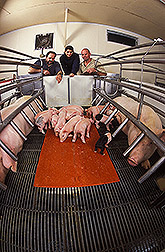This page has been archived and is being provided for reference purposes only. The page is no longer being updated, and therefore, links on the page may be invalid.
|
Read the magazine story to find out more. |
|
|
Company or a Snack? Letting Pregnant Sows Choose
By Don ComisMarch 15, 2005
Pressing the bar enough times brings a little snack one day, socializing with neighbors the next day. So far, pregnant sows are choosing the snacks.
Scientists have often compared pregnant sows in different housing situations. But now scientists from the Agricultural Research Service (ARS) and Purdue University are asking the moms-to-be for their preferences.
Purdue University animal behavioralist Ed Pajor, at West Lafayette, Ind., decided to do just that in a search for what little extras might enrich life for sows. Pajor is part of a team of Purdue and ARS animal welfare researchers at West Lafayette that includes ARS animal behavioralists Donald Lay, Jeremy Marchant-Forde and Ruth Marchant-Forde. The ARS part of the team also includes immunologist Susan Eicher and neuroscientist Heng-wei Cheng.
Pajor set up a study with 16 pregnant sows, studying four at a time. He put each animal in a conventional gestation stall designed to confine pregnant sows--but then added a control bar. On one day the bar allows a snack. The next day it opens a door to allow a visit with other sows. This goes on for several days, with the number of required bar presses increasing each day.
The sows' limits on how many times they would press the bar with their snouts for a reward were about the same whether the treat was food or socializing, indicating that socializing wasn't anything special to them.
But the next round of experiments will show if sows refine their choices in a more "homey" environment--one where there's more to do, a soft floor and plenty of straw to satisfy instincts for nesting or rooting.
The conventional stalls used in the first study are barren environments with slatted, cement floors. Pregnant sows are isolated, one to a stall, to make sure that each gets her proper diet.
Read more about the research in the March 2005 issue of Agricultural Research magazine.
ARS is the U.S. Department of Agriculture's chief scientific research agency.

